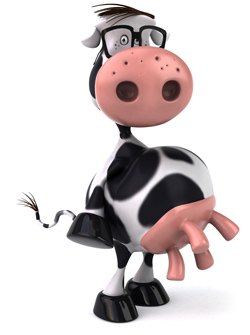
There are so many alternatives to consuming animal milk that choosing one might seem a little tricky.
When you think about it, cow's milk is designed by nature to grow a baby calf or bull calf from its birth weight of around 65 pounds, to a full-sized cow or bull which will end up weighing somewhere between1600 and 2400 pounds! Is it any wonder that dairy milk drinkers often find themselves struggling with their weight? And while the dairy industry does offer fat-free versions as well as 1%, 2% and so on, they have to replace the fat they remove with something to enhance the flavor and unfortunately, it's often sugar! (Don't even get us started!)
Overall, the unsweetened plant-based milk options are lower in calories, sugar, and fat, higher in calcium, and quite delicious.
Whether you choose a non-dairy variety because you're a vegan, an animal advocate, have allergies to dairy, or for the health of it, knowing a few of the nutritional differences might help you decide which one is best for you. Beyond that, it's really between you and your taste buds.
Here's the breakdown cup-for-cup in calories, total fat, protein, and calcium based on the % daily value:
ALMOND
60 calories
2.5g fat
1g protein
45% DV calcium
CASHEW
25 calories
2g fat
1g protein
45% DV calcium
COCONUT
80 calories
5g fat
1g protein
45% DV calcium
FLAX
25 calories
2.5g fat
0g protein
30% DV calcium
HAZELNUT
110 calories
3.5g fat
2g protein
30% DV calcium
HEMP
110 calories
7g fat
5g protein
2% DV calcium
OAT
130 calories
2.5g fat
4g protein
35% DV calcium
RICE
120 calories
2.5g fat
1g protein
30% DV calcium
SOY
90 calories
3.5g fat
6g protein
45% DV calcium
WHOLE MILK (DAIRY)
149 calories
7.7g fat
8g protein
28% DV calcium
BUTTERMILK (DAIRY)*
160 calories
9g fat
8g protein
30% DV calcium
*Did you know you can make sour milk - also known as "vegan buttermilk" by using any of the non-dairy milk alternatives listed above? Just mix one tablespoon of white vinegar per 1 cup of milk and set it aside for about 30 minutes. Use this method whenever a recipe calls for sour milk or buttermilk. The consistency may be slightly different, but the outcome is very much the same.
Some alternative milk provides unique health benefits not found in animal milk. Almond milk is high in vitamin E, magnesium, and potassium as well. Soy milk is an excellent source of protein. Studies even suggest soy milk may be able to lower cholesterol. So drink up! Milk really can do a body good!
Daily Values based on a 2000 calorie a day diet.

